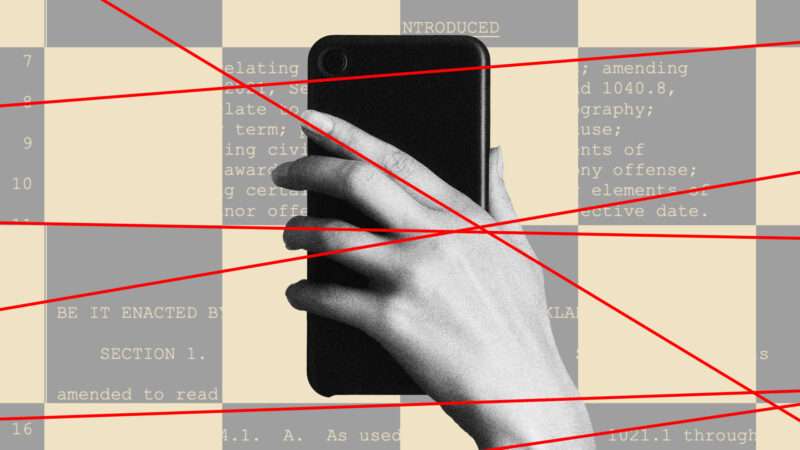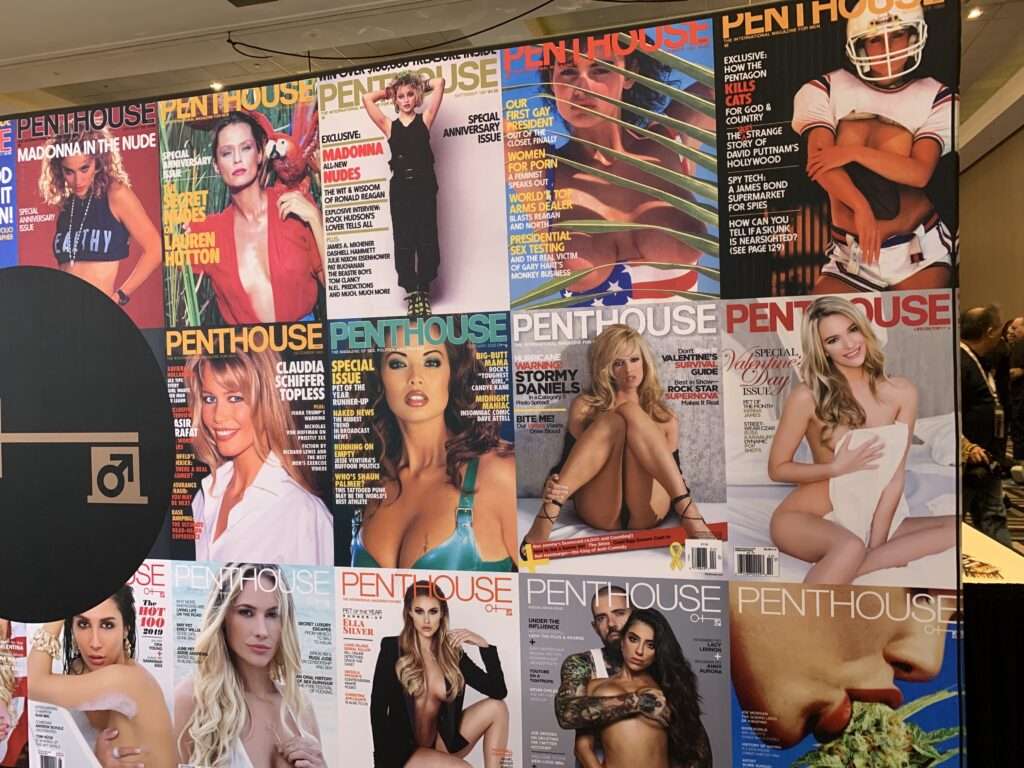
An anti-porn bill in Oklahoma is so extreme that it could even make sexting outside of a marriage a crime.
The wide-reaching bill would make merely viewing "obscene materials" a felony. It would also restrict "unlawful porn" distribution and production—with enforcement possible through both criminal prosecution and private lawsuits—and make it a misdemeanor to pose for, exhibit, or publish unlawful porn. And of course it would define these terms to include a huge array of sexually charged adult activity (far beyond what many people would consider pornography).
It's part of a wave of conservative plans targeting a very broad definition of "porn"—First Amendment be damned—that threatens not just "hardcore pornography" but all sorts of erotic expression. Whether or not this particular bill goes anywhere, it represents a resurgent moral panic over porn (more common on the right, but present in more progressive corners too) and associated attempts to restrict it. Sometimes these attempts take the form of pressure campaigns on financial institutions that do business with sex workers or porn companies. Sometimes they involve lawsuits against porn websites or other platforms where porn is shared. A lot of them lately have focused on requiring age verification for porn sites. And sometimes, as with this Oklahoma bill, they attempt to drastically expand what is considered illegal obscenity or pornography.
Defining Unlawful porn
The measure—Oklahoma Senate Bill 1976—comes from state Sen. Dusty Deevers (R–District 32), who also put forth legislation to repeal no-fault divorce. It's slated to be formally introduced on February 5, but the text was already filed last week, giving us advance notice about how bad it is.
By and large, the First Amendment protects pornography, though there are some big exceptions. It does not protect porn that depicts people under age 18. And it does not protect "obscenity," an ill-defined category that's been the subject of many a court case. But most adult pornography is considered protected.
Decades of First Amendment law notwithstanding, Deevers' bill attempts to carve out a new category of largely prohibited content called "unlawful pornography."
His measure defines unlawful porn as "any visual depiction or individual image stored or contained in any format on any medium including, but not limited to, film, motion picture, videotape, photograph, negative, undeveloped film, slide, photographic product, reproduction of a photographic product, play, or performance" when the depiction involves basically any sort of sex act, nudity, partial nudity, or sexual fetish. Unlawful depictions include "sexual intercourse which is normal or perverted," along with oral sex, anal sex, and masturbation. Also included is any "lewd exhibition of the uncovered genitals, buttocks, or, if such person is female, the breast, for the purpose of sexual stimulation of the viewer"; any depiction of "physical restraint such as binding or fettering in the context of sexual conduct"; and the undefined category "sadomasochistic abuse."
If this were just a ban on what people call "hardcore pornography," it would still be bad. But it's not just about "hardcore pornography." The unlawful porn definition is broad enough to include all partnered or solo porn photos and videos (even the more tame stuff), and possibly even erotic drawings, strip clubs, burlesque, drag, depictions of domination, and more.
All "unlawful porn" would be off limits to produce or distribute unless it was deemed to have "serious literary, artistic, educational, political, or scientific purposes or value."
Broad Enough to Target Sexting, Social Media, and More
S.B. 1976 would not just justify lawsuits or charges against porn production companies and websites such as Pornhub. It could also reach adult models, individual performers in porn videos, and even someone who simply sent someone who is not their spouse a sexually charged photo. (The bill says it's not meant to "prevent spouses from sending images of a sexual nature to each other.")
It could lead to lawsuits and charges against performers in live shows with sexually charged antics, including strippers, drag performers, and burlesque dancers.
It could also lead to lawsuits or charges against a wide range of distribution platforms. Sure, entities like Xvidoes and OnlyFans could be found liable—or at least tested in court—if they continued allowing access to people in Oklahoma. But so could any social media platform, video app, streaming service, etc., if it fails to stop adult content.
This would incentivize platforms to either block Oklahoma users entirely or—especially if more states follow suit—to start strictly moderating even remotely adult content.
Two means of enforcement
Like Texas' "abortion bounty law," SB 1976 would be partially enforced by private lawsuits. "Any person, other than an officer or employee of a state or local governmental entity in this state," could bring a civil action against anyone they think has produced or distributed unlawful porn, knowingly aided and abetted its production or distribution, or intends to do so.
Those found guilty could be liable for statutory damages of $10,000 for every image or depiction, plus "injunctive relief sufficient to prevent the defendant from violating this section" and the court costs and attorney fees of the person who sued. (Meanwhile, someone who successfully defended themselves against such a lawsuit could not recover court costs and attorney fees from the person who brought it, leaving no downside to filing long-shot lawsuits and a lot of expense even for entities or people eventually exonerated.)
The proposed law would also deploy criminal enforcement. Under S.B. 1976, it would be a crime to "buy, procure, view, or possess" any "obscene materials" (yes, view).
Obscenity under Oklahoma law is defined roughly according to the test set forth in Miller v. California. It includes "any representation, performance, depiction or description of sexual conduct" that, when taken as a whole, is determined to be "patently offensive as found by the average person applying contemporary community standards," as well as designed to appeal "to prurient interest in sex" and lacking in "serious literary, artistic, educational, political, or scientific purposes or value."
One might think that this test would rule out run-of-the-mill commercial pornography or the sorts of images that many people in intimate relationships send one another. But S.B. 1976 specifically states that all of the acts defined as unlawful porn (a category that includes so much as exposing a breast or butt cheek with an intent to titillate) "are depictions of sexual conduct which are patently offensive under contemporary community standards in this state, and have as their dominant theme an appeal to prurient interest in sex."
Unless that butt selfie is deemed to be a work of serious artistic merit, it would seem to fall under Oklahoma's definition of obscene materials, which would make it a crime to even so much as look at it.
The buying/procuring/viewing/possessing offense would be a felony, punishable by up to 20 years in prison or a fine of up to $25,000. So would "distribut[ing] any unlawful pornography that lacks serious literary, artistic, educational, political, or scientific purposes or value."
The bill would also make it a misdemeanor crime to "act in, pose for, model for, print, sell, offer for sale, give away, exhibit, publish, offer to publish, or otherwise distribute, display, or exhibit" content featuring unlawful pornography. Doing so would be punishable by up to one year in county jail or by a fine of not less than $2,000.
The GOP's Porn Panic
In a sea of statehouse porn panics, this new bill stands out. While a number of states have passed or considered laws relating to pornography being seen by minors, Deevers' bill goes several steps further and is an especially egregious affront to free speech.
Now, state lawmakers introduce crazy stuff—much of which has no chance of going anywhere—all the time. So it's tempting just to dismiss this bill as one dude's personal crusade. But even if that turns out to be true, Deevers' proposal reflects a broader crusade that is getting legislators' votes.
The GOP is really obsessed with porn these days. Not long ago, we saw a wave of Republican-controlled legislatures pass resolutions declaring porn a "public health crisis." Porn age verification bills have passed in Louisiana, Texas, and North Carolina. And despite some initial court rulings against age verification laws, similar measures are gaining steam in other states, with lawmakers in Ohio and Oklahoma alike introducing them just last week. (This newsletter will certainly be keeping tabs on these.)
Some legislators have introduced bills that would ban porn on devices unless users pay a fee. And several prominent conservative activists and politicians have been trying to define a wide range of content related to sexuality and gender identity as pornographic. This has been driving library book bans, restrictions on drag performances, limits on academic freedom, and more.
And it's not just state Republicans on the porn freakout beat. Such prominent lawmakers as Sen. J.D. Vance (R–Ohio), Sen. Josh Hawley (R–Mo.), and Rep. Paul Gosar (R–Ariz.) have railed against pornography in recent years. Conservative New York Times columnist Ross Douthat has opined that we should ban it.
In 2022, an initiative called "Project 2025"—spearheaded by the Heritage Foundation, with more than 50 conservative groups on the advisory board—released a manifesto on what Republicans should do if they take control of the federal government again next year. Porn "has no claim to First Amendment protection," writes Heritage President Kevin D. Roberts in the document's forward, adding that it "should be outlawed" and that the "people who produce and distribute it should be imprisoned."
Whatever happens with this Oklahoma bill, I don't think it will be the last we see of such attempts to target all sorts of sexual expression.
Today's Image
Each week, I'll end this newsletter with an image from my photo archives. These will generally be the result of Reason work or travel, but not always. Sometimes—like today—they may relate to the subject at hand, and sometimes they may be very random. (I have a lot of cool street art pictures, OK?) Consider this a palate cleanser after reading about all the ways authoritarians right and left want to control what you read, what you post, how you use your body, and how you use the internet.

The post Oklahoma Bill Would Ban Sending Sexy Selfies Unless You're Married appeared first on Reason.com.






